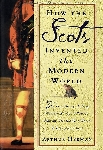How the Scots Invented the Modern World
Last updated: 17.12.19

| Printed: | 2001 | Author: | Arthur Herman |
| Publisher: | Crown Publishers | ISBN: | 0609606352 |
| Suppliers: | 





|
The True Story of How Western Europe's Poorest Nation Created Our World and Everything in It
Hardcover: 288 pages, usually ships within 24 hours.
Amazon Review
"I am a Scotsman," Sir Walter Scott famously wrote, "therefore I had to fight my way into the world." So did any number of his compatriots over a period of just a few centuries, leaving their native country and traveling to every continent, carving out livelihoods and bringing ideas of freedom, self-reliance, moral discipline, and technological mastery with them, among other key assumptions of what historian Arthur Herman calls the "Scottish mentality." It is only natural, Herman suggests, that a country that once ranked among Europe's poorest, if most literate, would prize the ideal of progress, measured "by how far we have come from where we once were." Forged in the Scottish Enlightenment, that ideal would inform the political theories of Francis Hutcheson, Adam Smith, and David Hume, and other Scottish thinkers who viewed "man as a product of history," and whose collective enterprise involved "nothing less than a massive reordering of human knowledge" (yielding, among other things, the Encyclopaedia Britannica, first published in Edinburgh in 1768, and the Declaration of Independence, published in Philadelphia just a few years later). On a more immediately practical front, but no less bound to that notion of progress, Scotland also fielded inventors, warriors, administrators, and diplomats such as Alexander Graham Bell, Andrew Carnegie, Simon MacTavish, and Charles James Napier, who created empires and great fortunes, extending Scotland's reach into every corner of the world. Herman examines the lives and work of these and many more eminent Scots, capably defending his thesis and arguing, with both skill and good cheer, that the Scots "have by and large made the world a better place rather than a worse place."
--Gregory McNamee
From Publishers Weekly
Focusing on the 18th and 19th centuries, Herman (coordinator of the Western Heritage Program at the Smithsonian and an assistant professor of history at George Mason University) has written a successful exploration of Scotland's disproportionately large impact on the modern world's intellectual and industrial development. When Scotland ratified the 1707 Act of Union, it was an economic backwater. Union gave Scotland access to England's global marketplace, triggering an economic and cultural boom.

